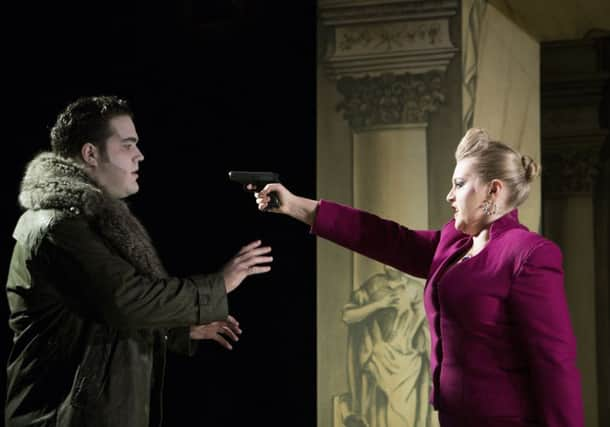Andrew McTaggart on Scottish Opera Emerging Artists


You can have all the degrees, all the knowledge and confidence in the world, but finding the opening that counts – that golden opportunity to gain hands-on experience on the shop floor – is the all-important passport to a career and ultimate success.
There was a time when a structure existed within UK opera companies that saw young opera hopefuls fresh out of college feed into company choruses, then graduate on to bit parts, the lucky ones then perhaps proceeding to a post as a contract principal – effectively the training ground and waiting room for the roles that dreams are made of: Rigoletto, Figaro, Billy Budd, Wotan, Brünnhilde, Mimi, Susanna, to name but a few.
Advertisement
Hide AdWe used to see that with Scottish Opera in the days when money was no object. But as we all know, its in-house chorus has gone, along with its full seasons of main scale productions, and principals are bought in by the job. Yet all is not lost, thanks to Scottish Opera’s Emerging Artists programme, which gives recent graduates – not just singers, but budding directors, composers, costumiers and repetiteurs as well – the opportunity of a full-time two-year apprenticeship at the very moment they need the leg-up into the profession.
One of the current crop of Emerging Artists at Scottish Opera is Scots baritone Andrew McTaggart. He, along with fellow “apprentice” Sarah Power (soprano) and two imported professionals (mezzo soprano Maire Flavin and tenor Paul Curievici), will star in the company’s forthcoming Opera Highlights Tour, which opens on Tuesday in Livingston before touring small venues the length and breadth of Scotland, from Orkney in the north, to Dalbeattie and Selkirk in the south.
When I spoke to McTaggart a couple of weeks ago, work had just started on the stage presentation. “Yes, it’s basically opera scenes, but if you want to look at it another way, we’re four singers and a piano doing a variety show,” he says. “It’s a lot of fun, but there’s a serious thematic link –operatic explanations of the different forms of love.”
McTaggart’s input takes him from the Prologue of Pagliacci, through Tarquinius’ aria from Britten’s The Rape of Lucretia, to a lighter second half as the Count in Mozart’s Marriage of Figaro and singing I got Plenty O’ Nuttin from Gershwin’s Porgy and Bess.
This touring experience, says the 28-year-old bass baritone, is every bit as valuable and fulfilling as performing in a big opera house, and just one important component in an apprentice scheme he began two years ago.
It followed on immediately from his studies at the Royal Conservatoire of Scotland, where he spent eight years as both undergraduate and postgraduate. Having caught the bug during his schoolboy years as a member of the National Youth Choir of Scotland, and finding stage experience as Fagin in Oliver and Daddy Warbucks in Annie for amateur productions in Glasgow, progression to the RCS was a no-brainer.
Advertisement
Hide AdYet ambitions of becoming an opera singer were furthest from his thoughts. “All the way through I thought I was going to be a teacher of some kind. The singing thing just seemed to emerge naturally.”
So naturally, in fact, that McTaggart found himself fully involved in the RCS’s ambitious Russian collaborations with Rostov-on-Don and Scottish Opera – productions of such major repertoire as Prokofiev’s The Love of Three Oranges and the epic War and Peace, in which he landed the part of Matveyev.
Advertisement
Hide Ad“Okay, there are so many roles in that opera, so I was ‘second baritone to the left’”, he jests. But there was more to come, as Don Carlos in Prokofiev’s Betrothal at the Monastery, and the Badger in Janacek’s Cunning Little Vixen.
Those student opportunities to get his teeth into character parts were the perfect grounding for McTaggart’s acceptance into the Emerging Artists scheme.
“The beauty of it was that Scottish Opera had already seen me in those collaborations. I auditioned and got accepted,” he says. “To take such an important sidestep into your national company was something I felt a massive amount of pride in.”
“They immediately sit you down and offer you what they think is the best programme for you,” McTaggart says. “For me it was to be a mixture of bigger roles on small-scale productions [Garibaldo in Handel’s Rodelinda, for instance], smaller roles in big-scale productions [the Notary in the currently running Donizetti’s Don Pasquale], and the chance to cover big roles in big productions as well. But mostly, it has given me the experience of doing things well and doing things badly, and a safe place to make those mistakes and learn from them.”
It all ends in May with his performance as Yamadori in this season’s closing production of Madama Butterfly, beyond which McTaggart feels fully-equipped to tackle the challenges of going it alone in the cutthroat professional world of opera.
“The other benefit of the Scottish Opera scheme is that they invite agents to hear you,” he says. “I’m lucky enough to have been signed up by one, as a result of which I’ve auditioned for three of the national companies, and they’re all interested. Companies like Glyndebourne are not thinking of me for chorus work, but for a potential role.”
Advertisement
Hide AdHe has dream roles in sight. “I’d love one day to sing Rigoletto, and probably before that Billy Budd.” The most important thing is that McTaggart has been given the opportunity to walk before he can run. That has to be in his favour.
• The Scottish Opera Highlights tour opens on 25 February at Howden Park Centre, Livingston (01506 777666). For information on the full run of performances around Scotland visit www.scottishopera.org.uk